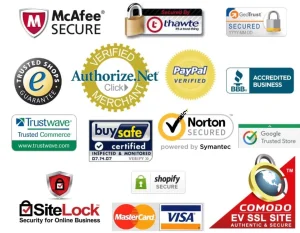Small businesses can use trust badges to establish that all-important consumer trust. They are a powerful way of reassuring customers that a website is secure and that the business is legitimate and credible.
But what exactly are trust badges, what are their benefits, and how should they be used? We cover all these important questions in this article.
What are trust badges?
Also known as site seals or trust seals, trust badges are digital icons that confirm a company’s security. They can either be purchased, awarded by third-party organisations, or created individually.
There are badges for different types of verification, such as security (confirming online store safety), payments (processing shoppers’ payments securely), and industry certifications (validating that you meet industry-specific standards).
Here are some common trust badges you may have seen:

Source: Shopify
Common types of badges
Trust badges come in many different forms. Here are some of the most common types:
Security
Security trust badges let your online visitors know that your website is safe. More specifically, it is protected against digital scams, payments are safely processed, and personal information is processed securely.
These badges are normally obtained through a Secure Sockets Layer (SSL) certification. SSL protects data through encryption. This means that a user’s information is securely transmitted between their browser and the web server, preventing hackers from intercepting and accessing it.
You can purchase an SSL certificate through a trusted provider like SSL Trust, Ionos, or GoDaddy. You’ll then receive a digital icon from them to use and your website URL will feature a padlock icon to demonstrate security.
Payment
When a customer is ready to check out, a payment trust badge will indicate that their card details are processed safely. You can obtain this verification logo from your payment provider.
Payment trust badges also include icons of the card types and payment methods that you accept. This might be VISA, Mastercard, PayPal, Apple/Google Pay, or Klarna.
Not only are they free, but showcasing a range of these established and trusted logos on your website can help you reach a wider audience and create a convenient and transparent user experience.
Customer reviews
Customer reviews are crucial to new customers trusting your brand. These trust badges are normally in the form of star ratings, testimonials, or the total number of reviews received.
They can either come from your own website or social media profiles, or third-party review platforms like Trustpilot or Google Business Reviews. When you start to accumulate positive reviews, be sure to display these on your digital channels to reflect your trustworthiness.
Industry certifications
If your company achieves industry-specific certifications, you’ll receive a trust badge from the organisation to use alongside your branding.
This might be the Red Tractor logo (showing that you meet the assured food standards), a PETA badge (showing that you comply with animal safety), or a B Corp certification (showing that you meet high social and environmental standards) – among many other recognised certifications.
Industry certification badges are extremely important in establishing consumer trust. They show that you’re an accredited, high-quality business. Not only can they encourage people to choose your brand over others, but they can also promote brand loyalty if customers know that your company shares the same values as themselves.
Other trust badges
Another type of trust badge concerns social media. If you have a social media presence, you should link your business profiles to your website by displaying and hyperlinking the logo of the platform(s) you use.
You have also probably seen a ‘Money-back Guarantee’ badge. This shows that you promise your customers a certain level of promise and quality by offering a refund if a customer is unsatisfied with your product or service.
There are also delivery trust badges, such as ‘Free Shipping’ and ‘Free/Easy Returns’. If you offer these services, these are all free icons that can significantly improve a user’s experience, instil confidence and trust, and promote repeat business.
Benefits of using trust badges
Convincing new customers to trust a small, unfamiliar brand is challenging – especially online. Simply saying that your website is safe is not enough, but here’s how trust badges can help:
Gain consumer trust
For small businesses building up their brand awareness, trust badges can be incredibly effective in gaining vital consumer trust. Particularly in the current climate where hacking and phishing attacks are on the rise, online shoppers are becoming more sceptical about sharing their information with unknown companies.
However, security trust badges can make your website more visually secure, reassuring visitors that you’re an approved, credible business and that your website is safe to use.
Brand new businesses that want to establish consumer trust quickly can also achieve this through the use of trust badges.
Boost conversion
Trust badges can be the deciding factor between an abandoned cart and a confirmed purchase. According to a study by Baymard Institute, 25% of online shoppers don’t complete the checkout process, because they don’t trust the site with their credit card information.
Losing customers due to a lack of payment trust is a high risk for start-ups. However, you can boost your conversion rate with a payment security or ‘Money-back Guarantee’ trust badge. They reassure customers that their card details will be processed safely and they can get their money back if they’re unsatisfied.
Protect your business
Obtaining security badges not only protects your customers but also your business. It keeps your internal systems and data safe from online fraudsters and hackers who could try to compromise your site.
If you own a fintech or finance business, this is especially important in light of the latest news concerning hackers targeting these industries.
Improve brand reputation
You can significantly improve your brand reputation by creating a genuine, trusted website and validating it with a trust badge. This will show that your business takes security and privacy seriously and that you value how customers perceive you.
In addition, once a customer has had a positive and safe experience with your website, they are more likely to return and become a loyal customer.
Better user experience
Applying relevant trust badges to your website can significantly improve user experience (and the overall success of your business). These icons play a big part in your design and messaging, which determine how your audience will interact with your brand.
A positive, safe, and memorable user experience means that shoppers are more likely to return and become loyal customers.
Efficient communication
Trust badges allow you to communicate important security information with your customers easily, quickly, and efficiently. Rather than nestling these crucial website safety details in your ‘About Us’ or ‘Privacy Policy’ section, visitors can see your trust badges as soon as they land on your site, and instantly know that you’re a legitimate business.
Essentially, trust badges are the key takeaways your customers need to know to trust you. But they shouldn’t be limited to just your website.
Be sure to include relevant trust badges in various communication forms (such as newsletters, marketing emails, and your social media profiles), to educate your audience about your credibility, no matter how they interact with your brand.
Where to display them
Trust badges are generally for online use. Depending on the badge itself, there are different ways to best utilise them around your website and other digital communication channels.
Your home page is where you should host most – if not all – of your trust badges. If you have several, they typically go in the footer to avoid overcrowding your main landing page.
However, you might want to place customer review badges, for example, above the fold (at the top of the page before needing to scroll), to ensure they are easily visible and don’t get missed. Other badges like industry certifications or social media logos normally go in the footer.
- A guide to refunds when selling products online
- How to build a brand for your business
- 10 things your company website absolutely must have
If you have any specific product-related trust badges, these should be placed on the individual product pages. For example, maybe you have an award-winning product or service, or one that’s especially highly rated by your customers.
The checkout page is another key area for badge placement. Payment security, shipping, money-back guarantee, and payment provider badges should all be displayed when a customer is prompted to fill in their payment details.
As mentioned earlier, it’s also a good idea to display some of your trust badges on other channels. For instance, you may want to post a social media update about a particular accolade that your business has achieved or include it in a company newsletter.
If you don’t have a website
The benefits of trust badges are not limited to e-commerce businesses. If you don’t yet have a website or run an offline business, there are plenty of ways to use these icons to your advantage and grow your brand.
For example, when advertising your products or services in a local newspaper, choose the most relevant/valuable badge to include in your advert.
Let’s say you own a landscaping company with an impressive Trustpilot rating of 4 out of 5 stars. You can incorporate the Trustpilot logo and star rating into your offline advert.
Alternatively, if you have a branded van, you could print a badge on your company vehicle to promote trust as you travel to your clients.
Whether you earn them from a third party or create your own, all types of businesses can benefit from trust badges.
Thanks for reading
From security and payment to reviews and industry certification, there are many different types of trust badges your small business can obtain to gain credibility online. Displaying them effectively on your website can be a powerful way to earn consumer trust and boost brand awareness and reputation.
Thanks for reading. Please post any comments or questions you may have below.
Please note that the information provided in this article is for general informational purposes only and does not constitute legal, tax, or professional advice. While our aim is that the content is accurate and up to date, it should not be relied upon as a substitute for tailored advice from qualified professionals. We strongly recommend that you seek independent legal and tax advice specific to your circumstances before acting on any information contained in this article. We accept no responsibility or liability for any loss or damage that may result from your reliance on the information provided in this article. Use of the information contained in this article is entirely at your own risk.














Join The Discussion